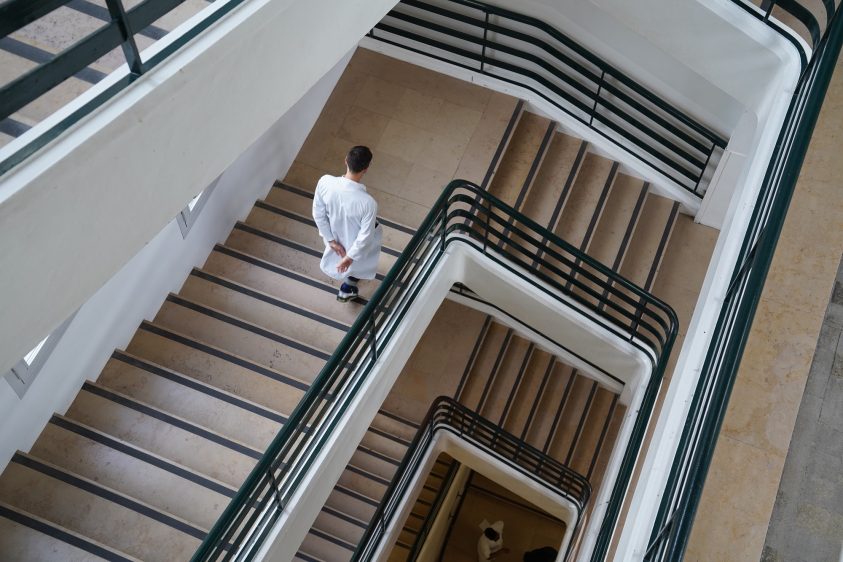The busy public hospital in the Parisian suburb of Clichy has one psychiatrist on staff. Every day, as doggedly tracked by the nervy handheld camera of Nicolas Peduzzi’s “On the Edge,” he deals with some of the most intractable afflictions the hospital ever sees. His patients, often referred to him after being treated for other ailments, can be mentally ill, traumatized, addicted, depressed, suicidal or any combination thereof. After Claire Simon’s wonderful “Our Body” and Nicolas Philibert’s Golden Bear winner “On the Adamant,” this CPH:DOX award winner is the third major doc in about as many weeks to be set deep in the belly of the French healthcare system, and while it is its own, remarkable achievement, it also merits the comparison.
Some of the doctor’s patients turn violent, and are in need of restraining and sedation. Some are hostile. Still others can, heartbreakingly, prove to be too trapped in their own miseries for rescue. But through the application of a borderline superheroic level of attention and sympathy, most respond to the doctor’s ministrations, while he himself dances ever closer to burnout or collapse in caring for them. Meet Dr. Jamal Abdel-Kader: Depending on how you feel about astronauts, oil riggers and Alaskan crab fishermen, he might have the most challenging job in the world.
We’re introduced to 34-year-old Jamal from behind, a fluttering white coat walking briskly down one of the hospital’s corridors. We see a lot of the institution’s thoroughfares, its shabby hallways and Escher-like interior and exterior staircases, since Jamal is almost always on the move. It’s all Peduzzi’s camera can do to scurry after him, but often he’ll call back over his shoulder to bring us up to speed on his latest treatment, or to finish a thought. By this stage, Jamal has developed walk-and-talk skills that would make Aaron Sorkin envious.
Gaël Rakotondrabe’s superb score lends further pace and pathos to this deceptively artful film, which in an unshowy way also incorporates several unexpected stylistic flourishes, from slow dissolves to black-and-white photomontages to the occasional, judicious use of slow motion, the better to give an impression of the amped-up tempo at which Jamal must constantly perform. Indeed the music, with its banging, techno-style beats looped against plangent piano, analogizes Jamal’s predicament rather perfectly. He too is trying to create some kind of melodic grace out of the pounding, greedy rhythms of his day.
In one room, there’s gentle, recuperating addict Aliénor, who lost both her legs and a forearm in a drug-fueled fall from a bridge. In the next, there’s Wendy, a young man admitted for pancreatitis but brought into Jamal’s care when it became clear the pain of it was at least partly symptomatic of much deeper issues. Down the hallway, a young, hyper-religious, clearly unstable Dutch woman begs not to be sent back to her abusive mother in Maastricht. Down another passage, a drunken, belligerent man is tied to a stretcher at Jamal’s reluctant order; the last resort after he’d tried and failed to calm him enough to allow treatment.
What’s remarkable about all these cases and more, is the intense, individual attention Jamal provides, treating each patient with dignity and compassion. And at a time when it’s increasingly acceptable for doctors to just prescribe and move on, many of his therapeutic strategies are pleasingly old-school. He brokers reunions between estranged family members and does theatrical group therapy in which patients play out scenes from Moliere and Shakespeare. And when all else fails, he is willing to play a video game or discuss medical TV shows (Jamal is a “Scrubs” guy) — anything to keep his often marginalized, outcast patients connected to him and therefore to the whole world through him.
It’s an incredible burden to bear so seemingly lightly, but the strain of doing so in such under-resourced circumstances does tell on him. He wonders aloud if he is becoming complicit in the system’s failures by working so hard to make up for them. Otherwise, his few moments of respite are spent with his intern Alice, or nurse’s aide Romain, but it’s notable how often even those conversations become ways for his colleagues to talk through their own issues and fears. Alice confesses to moments of depression in her past; Romain tells him about a nurse who used to work alongside him in these very wards, who has just recently been admitted as a patient. There is something about Jamal’s good-humored, sensitive presence that invites confidences; one can only fervently hope, after “On the Edge” gives us a glimpse at his extraordinary vocational dedication, that this deep believer in the human right to be listened to, has someone listening to him too.
Read More About:
Source: Read Full Article

